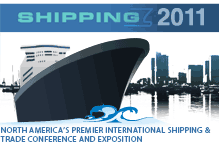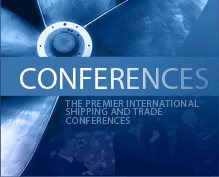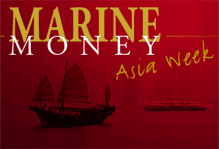
INLAND WATERWAYS AND EUROPEAN INTEGRATION
By John Stoker
For the average traveler to Europe, it has become as commonplace to complain about the traffic in London or Paris as it is to complain about gridlock in New York. The burgeoning integration of Europe with its attendant transport plans and policies has led to greater utilization of trucks and highways than it has of rail, to say nothing, of waterborne commerce. The European development of its national and international highway systems has been quite effective in bridging the gap between West and East. But the cost of such highway developments has led to increased traffic congestion and bottlenecks in transport infrastructure improvements.
Because of the commonplace aspects of highway congestion, pollution, and increased risks in highway vehicle operations, the European Commission (as the central planning agency for the European Union) has embarked on a comprehensive program to relieve the European transport system of its over-reliance on highway systems and has led to policy pronouncements in regard to improving rail and waterborne systems.
Continue Reading
THE YEAR IN HIGH YIELD
By Jim Lawrence
High yield bonds have brought out the worst in the shipping industry; from affiliate transactions to dubious valuations, from threats to hide ships in unfavorable jurisdictions to partners backstabbing each other in greed. Not surprisingly, we’ve also seen some of shipping and the financial community’s most aggressive characters swarm around broken shipping deals like moths around a light bulb on a still summer night.
The last 24 months have been like a showcase of the ‘serious understanding gap’ which still exists between Wall Street and Shipping. It can also certainly be said that there is plenty of blame to go around: the capital markets promoters who performed questionable due diligence in their rush to market, the investors, who threw money at yields during those heady market days, owners who became inflamed by dollars, the advisors who promote the ‘bravado of process’ while fees mount up and up, and even the vultures who insisted ships are like strip malls continuously by misunderstanding the complexities of shipping as value eroded away. The Class of ’97-’98 bonds certainly damaged the fragile relationship between shipping and the capital markets, but not over the long term. Continue Reading
Equity Momentum
By Matt McCleery
Roadshows and red herrings, quiet periods and Lucite “deal toys” – all we can say is after two years of bitter high yield restructuring, it feels damned good to see new deals getting done and value being created, not just battled over.
What’s more, the deals we’ve seen actually look good. We hate to be cynical, but in some cases tanker equity offerings have provided little more than a lucrative exit for in-the-know insiders. That doesn’t seem to be the case this time around. Stelmar accepted dillutive pricing and gave up majority control in an effort to build a larger, public, transparent organization – and they have already been richly rewarded for doing so. Genmar is a bona fide tanker consolidation story. Most of the General Maritime investors are locked into the deal for a year with an uncertain outlook for tanker stocks. Continue Reading
Editor: Matador Beware the Bull
Back in April Marine Money gave a valuation of General Maritime (Genmar) with the pronouncement that the deal would be priced by the middle of May. Well, we were wrong about the timing, pricing is due 11th -12th June.
The timing for Mr. Georgiopulos could not be better. Marine Money believes this IPO is good for the market. Tanker shares are at all time highs. Tanker earnings for Q1 and Q2 look set to be very strong. Energy shares are all the rage on Wall Street. Tanker earnings multiples remain, even for cyclical shares, rather low. Time is ripe to go public in tankers and others seem likely to follow Stelmar (of March of this year) and Genmar: American Eagle Tankers (AET) for one, but Frontline is likely to follow with its NY based listing soon. MIF has been mentioned as considering doing the same. Anangel-American looks set to absorb ACOL tankers under their shares. The Aloufouzos controlled Kyklades Maritime has $661m in assets that may also be being considered for a NY float. Continue Reading
DVB Research and the Erika Effect
By Urs M. Dür
David Berge of DVB Nedship recently published a research report, “The Shipping Landscape: Crude Oil Tankers”. It is a good example of why we think commercial banks bring a lot more to the table than just loans. DVB’s commitment to delivering an economist’s perspective on market analysis was successful. Few investment banks take the time to, for example, explain the coefficient of determination for tanker rates vis a vis import demand.
The only point to which we take exception appears is the following statement, which appears on page 29 of the DVB research report: “The tanker market recovery of 2000 is a classic example of an effective UPDE [unexpected positive demand event], driven by demand events, but enabled by the supply situation. The ‘Erika Effect’ is a misnomer.” Continue Reading
Dancing on the Grave
By Geoff Uttmark
It’s better being right than being scooped, even if the scoop is for the right reasons. “Scooper” in this instance is the NASDAQ, “scoopee”, partially at least, was the May issue of Marine Money, “Market Power”.
In part 2 of our article on the attractions of convertible bonds for shipping, we analyzed American Classic Voyages’ convertible cumulative subordinated preferred security. Title of the article, “Converts to Shipping …” makes it clear the story is the instrument, not the company. Yet our real-world analysis of a convert in action focused on AMCVP, around $25.30 per share when MM went to print, AMCV common at $10.10 per share. After running some numbers on AMCVP, our article did conclude with “keep the Dramamine handy, and a life jacket too.” That was before AMCV released Q1 earnings on 8 May, characterized by some as potentially “keel-breaking”. Continue Reading
Bankers are Getting Busy
By Matt McCleery
Bankers are busy these days. One reason is that there are a lot of deals in the market. Another reason is that shipping desks are consistently short staffed. Or maybe it’s because Teekay Shipping held its bankers meeting in Germany last week. Since Teekay bankers now include all those who financed Ugland Nordic, Bona and Teekay, nearly every shipping banker on the planet was away from his or her desk for a few days. As one cynical shipping banker said, “a bomb going off at the Teekay bank meeting is just about the only way enough capacity would come out of shipping finance to actually push pricing up to where it belongs.”
There are also quite a few new shipping deals coming to market in the second quarter and third quarters. One reason for this is that the tanker market looks strong into 2005 and companies are structuring their debt accordingly. Continue Reading
Editor: 13G; A Lack of Debate
In 1994 I wrote a paper regarding the impact of Certificates of Financial Responsibility (COFRs) mandated by the US Oil Pollution Act of 1990 and their potential impact on tanker economics. The result was inconclusive. The industry either did not know, did not want to reveal, or, like ostriches with their heads in the sand, did not want to know the quantified implications COFRs. There were two prevalent schools of thought: One held by the owners, whereby there would be a “train-wreck scenario” with Owners refusing to pay for COFRs, avoiding trade to the US and driving the cost of petroleum products up. The other was “wait-and-see”: There would be a focus on liability and environmental safety at a reasonable cost. Continue Reading
DE-LISTING: PAPER BEAT STEEL?
By Urs M. Dür
In the United States, and other English speaking nations, there is a game called “Rock, Paper, Scissors” whereby verdicts are reached between adversaries in a dispute on the playground basis who picks the stronger of the choices spontaneously. For example, “rock” beats “scissors” and “scissors” beat “paper”. Pick correctly on a given chance and you win the decision. Yet there is a main fault to this game in that there is no incentive to choose “paper” because it is always the weakest option in the game. Or is it? Children debate that paper often has more power than rock, akin to the argument that “the pen is mightier than the sword”, etcetera.
In these heady days of potential tanker IPO’s, we see equity being attractive to certain owners and conversely, in the last 12 months we have seen some examples of majority owners and large shareholders giving up the public dream and taking their company private, de-listing. Some of these take-overs/de-listings have been completed below Net Asset Value. For the investor, paper beats steel, if not rock, on these occasions. Continue Reading
Mr. J. C. Lyras, Speaks at CMA Annual Conference
March 20th, 2001
“The CMA Annual Conference takes place at a time when much adverse publicity has been given to recent maritime accidents creating negative feelings among the public and officials about the shipping industry as a whole. This in turn undermines the importance of shipping worldwide to the extent that no other of its vital features (strategic, economic, even cultural) are visible any longer. I am referring to the accident of the tanker “Erika” in December 1999 off the coast of France as well as the more recent accident of the vessel “Jessica” in the Galapagos Islands.
“Undoubtedly, no one is allowed to underestimate the damage caused to the marine environment by the above casualties as well as the legitimate economic damage. Nor is anyone in the industry allowed to be complacent about the need to constantly look for ways to improve safety standards and to eliminate as far as possible the causes of such accidents. At the same time it is necessary to put such accidents in the right perspective not only in the interest of objectivity but also in order not to introduce hasty measures which may be politically expedient but which are inappropriate or ineffective though invariably costly. Continue Reading







